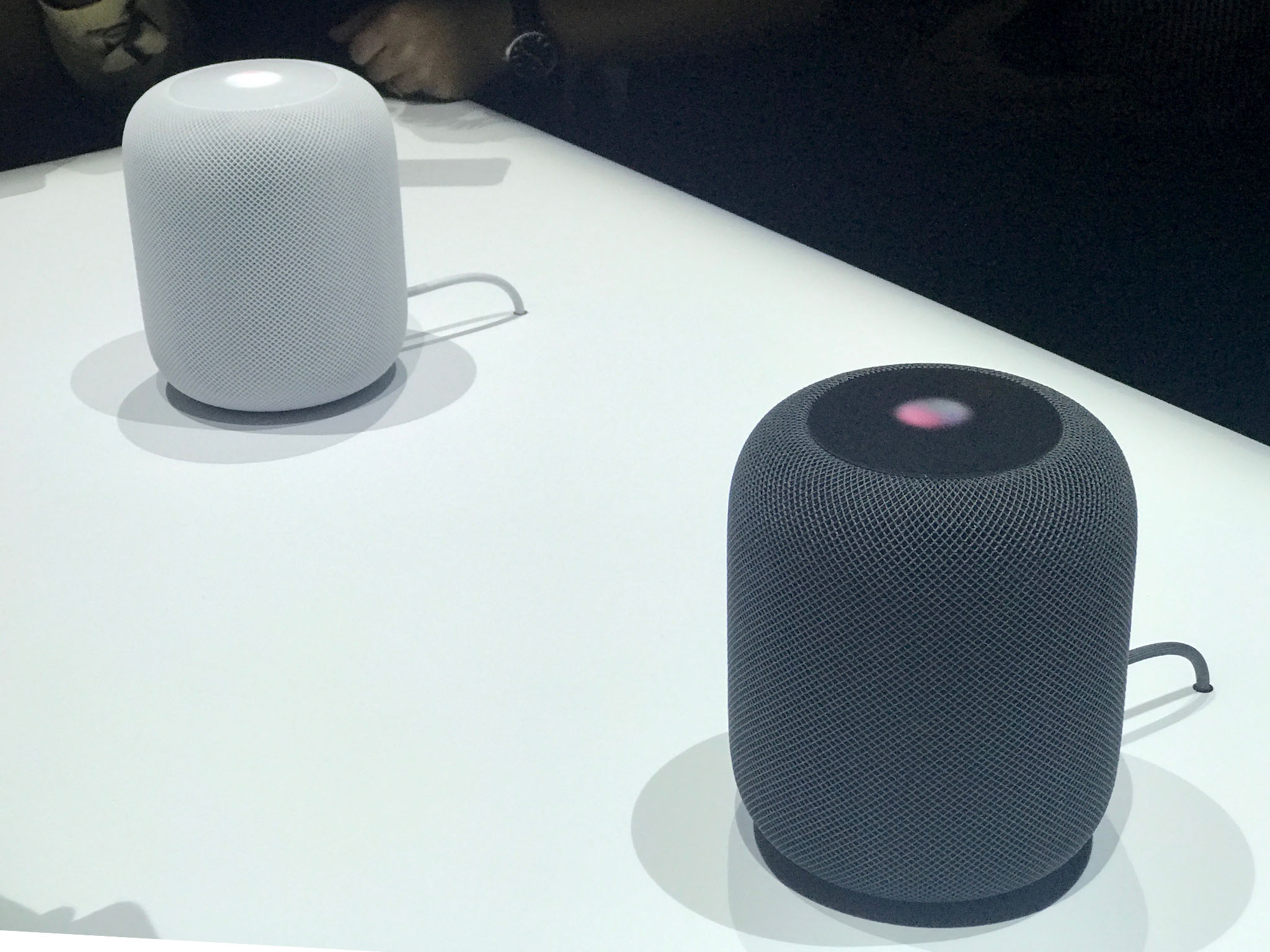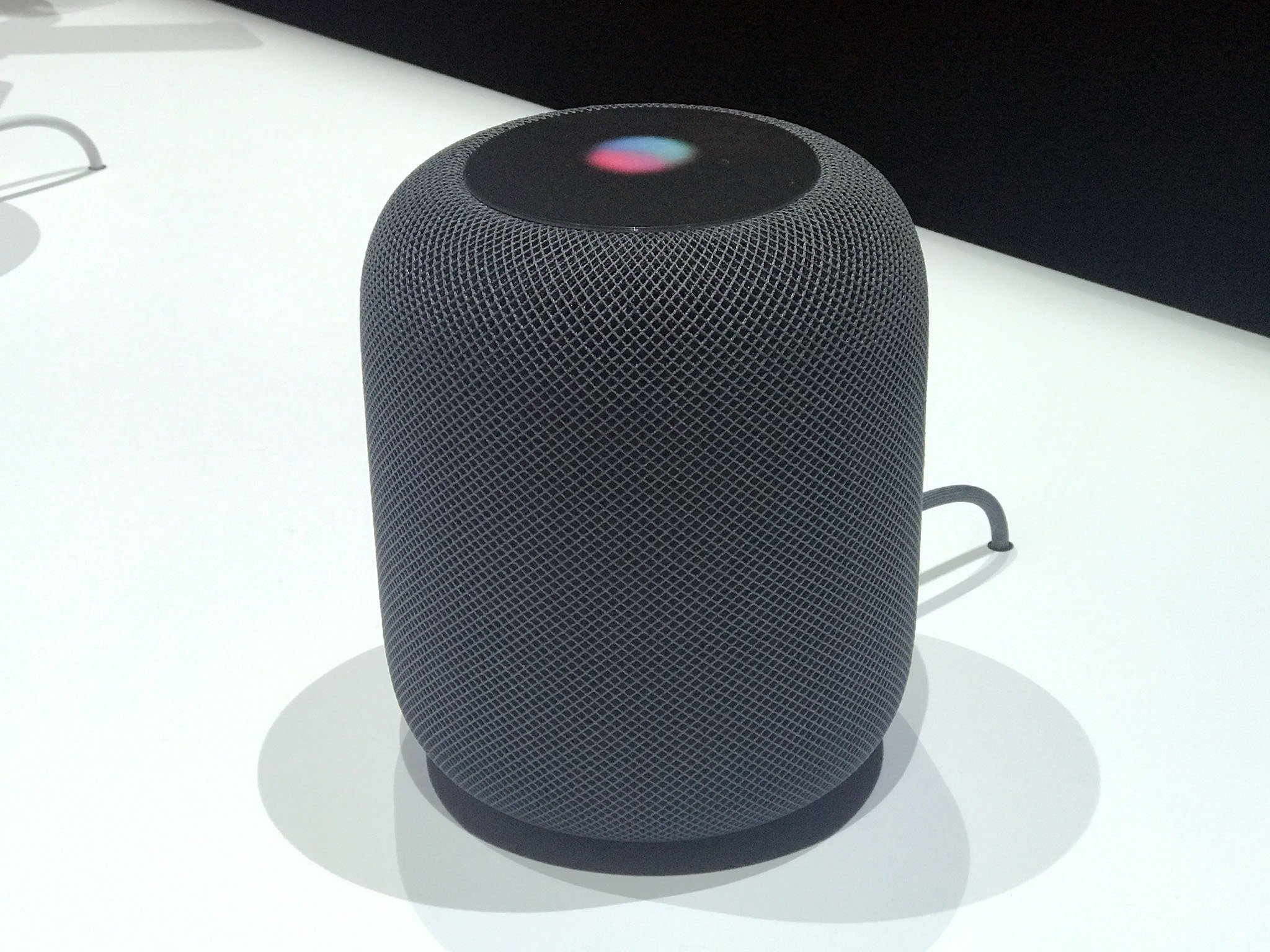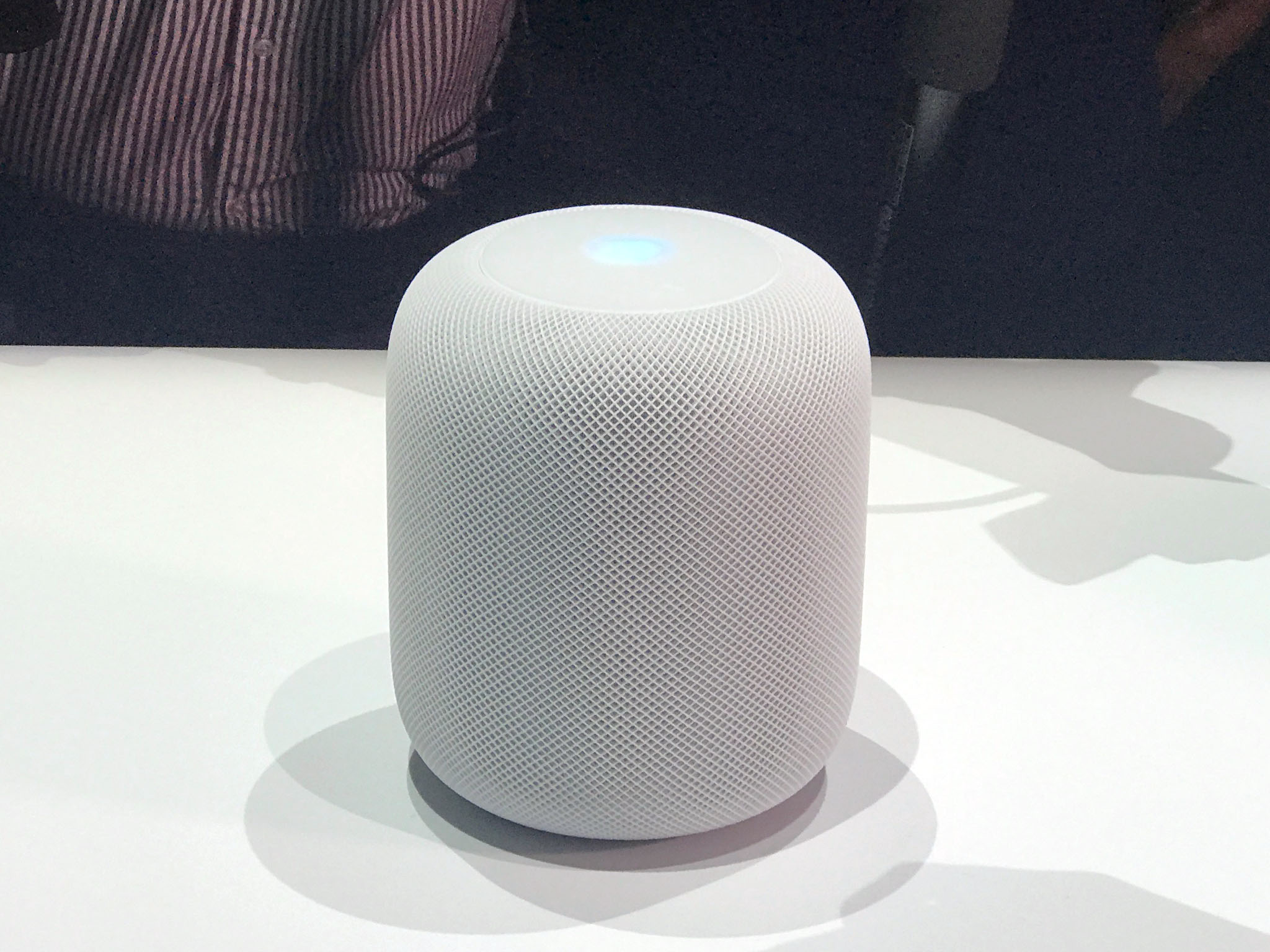HomePod: This is Apple's Siri Speaker

Apple's HomePod looks… well, like a pod. It's textured like a speaker should be, and available in white and black. Snaking from the bottom is a simple power cord; on the top, a display that shows just one thing — the familiar Siri wave interface.
January 26, 2018: HomePod now available for order in U.S., U.K., Australia
Apple's HomePod is now live on Apple.com and select third-party resellers, like Best Buy. You can pre-order now in white or space gray.
Making the speaker smarter
The market today offers several of "smart" speakers, but they're either music-focused, like Sonos, or assistant-focused, like Amazon's Echo and Google Home. There's no option that truly covers both areas — and that's what Apple is trying to change. With HomePod, Apple is aiming to cover the home assistant market and the smart speaker in one go.
Apple's focus and history with music is a lengthy one, and it makes sense that the company would target both music and smarts in its first intelligent speaker go — Apple isn't interested in making a $40 connected smart gadget that provides a terrible music experience. It wants to deliver high-end, high-quality sound along with a high-end, high-quality assistant.

Last year, Apple introduced AirPods with the W1 chip, a bevy of sensors, Siri control, and a pretty good amount of smarts. Designed for mobility, the AirPods found quick success — but they weren't designed to please a whole household or family.
HomePod is the equal and opposite part of that equation. It's designed not just to fill your ear — it wants to fill your rooms. But the speaker is more than just tweeters and woofers; it has an Apple A8 chipset. That's the same chipset that powers iPhone 6 and Apple TV, and it makes HomePod a fully-featured computational audio device.
iMore offers spot-on advice and guidance from our team of experts, with decades of Apple device experience to lean on. Learn more with iMore!
Computational audio
Siri for HomePod wasn't been shown off at WWDC. That'll no doubt come closer to release. But I did get the chance to hear HomePod's music chops. And it was was impressive — especially when compared with a Sonos Play:3 and an Amazon Echo.
Sonos makes great speakers, but listening to the HomePod is like the experience of moving to a Retina screen — you don't realize what you've been missing until you see it. (Or, in this case, hear it.) The HomePod has much better sound separation than Sonos: It's cleaner, brighter, and more robust, with clear vocals and booming background ambiance. Amazon Echo can't hold a candle to either: It just sounds like a tiny, tinny toy speaker.
The HomePod reminds me of Portrait Mode on iPhone 7 Plus. There, the power of the A-Series processor allows the Camera app to do far more than what the camera itself is otherwise capable of. Apple's speaker works similarly, taking in your music (from Apple Music or another device via the AirPlay 2 protocol) and computing the hell out of it. The A8 chip analyzes your music in milliseconds to provide the best EQ, balance, and projection for your exact room layout.
It's like it takes apart audio, separates and analyzes all its aspects and layers, then fills the room with crisp, clear, distinct vocals and full, rich, almost-luscious sound.
As a result, it sounds like a layer of muddiness and dullness has been wiped away, leaving music that is suddenly sharp and defined.
(Siri + HomeKit) * Privacy
There's still a lot we don't know about HomePod. Apple was providing a preview at WWDC, not a full on product release. There are also a lot of limitations, though none that are unusual for a first generation product — especially one from Apple.

For example, HomeHub can play your Apple Music directly from the cloud, but everything else has to be streamed from your iPhone or iPad (and/or presumably Mac). If you want to play Spotify, Pandora, Amazon (including Audible), Tidal, or anything else, you have to AirPlay it using Apple's new, multi-room AirPlay 2 protocol. And only AirPlay 2. There's no support for standard Bluetooth streaming.
HomePod will also support Siri and HomeKit upon its release later this year, allowing you to ask questions, give commands, and control all your existing home automation accessories, like lights and plugs.
It's so much that I feel likely to replace at least a few of my existing Sonos speakers. I'd rather use them as a complement to the HomePod, of course, but they don't support AirPlay or HomeKit — and that's table stakes for me right now.
Apple being Apple, the company has also built the HomePod to prioritize privacy: The device listens for "Hey Siri," yes, but that command word is processed entirely locally on the device — no data is sent to Apple unless and until you speak the magic words. Even then, HomePod only sends anonymized data; it's one of the benefits of a company that doesn't make data harvesting its central business model.
HomePod will be available later this year for $349. I'll be getting a couple for my living room and a few for my house. I just have to decide between white and black.
January 23, 2018: HomePod arrives February 9, available to order this Friday
From Apple:
HomePod, the innovative wireless speaker from Apple, arrives in stores beginning Friday, February 9 and is available to order online this Friday, January 26 in the US, UK and Australia. HomePod will arrive in France and Germany this spring.
January 22, 2018: Rumors of multi-personal and muted Siri as HomePod launch approaches
First up, a feature that could come in handy when you just want to control your HomePod but don't want any backchat from it, especially when you have guests.
According to the Home app assets, users with HomePod will be able to create "scenes" that disable Siri temporarily. It will probably be very useful for parties. pic.twitter.com/k2gPc50KmrAccording to the Home app assets, users with HomePod will be able to create "scenes" that disable Siri temporarily. It will probably be very useful for parties. pic.twitter.com/k2gPc50Kmr— Filipe Espósito (@filipekids) January 21, 2018January 21, 2018
In terms of Siri on HomePod being Apple's first multi-personal assistant, Espósito hedges:
There's some strings that suggest that. I'll be looking for more references.There's some strings that suggest that. I'll be looking for more references.— Filipe Espósito (@filipekids) January 21, 2018January 21, 2018
The HomePod that launches this quarter will be version 1.0. Apple will iterate on it. Looking back now, it's incredible to see how far iPhone, iPad, Apple Watch, and Apple TV have come, especially in the last few years.
I still think what we have now will give way to mesh voice networks in the future, but HomePod will help get us to that future faster.
January 19, 2018: Apple receives FCC approval for HomePod
One more step towards the road to release: Apple has received FCC approval for HomePod. That means Apple is now legally allowed to start selling its smart Siri speaker in the U.S. just as soon as the company is willing and able.
So, don't start lining up until Apple announces a specific date... but maybe start thinking about what you'll wear.
January 17, 2017: HomePod supply building, still expected for Q1 2018
HomePod is being assembled for Apple by both Inventec and Foxconn. The former has reportedly completed an initial production run of roughly one million units. That means Apple is starting to build up supply before its expected release in the next couple of month.
According to the Taipei Times:
Inventec Corp (英業達), one of the two assemblers for Apple Inc's HomePod, has started shipping the US company's long-awaited "smart" speaker with an initial shipment of about 1 million units, industry sources said."The Taiwanese company has begun HomePod shipments. However, revenue contribution from the product to Inventec is expected to be limited this quarter, as the initial shipment is not large," a source in HomePod's supply chain told the Taipei Times by telephone on condition of anonymity.
Not major news but good news for those watching for signs of HomePods upcomming release.
November 17, 2017: Apple pushes HomePod to early 2018, 'needs a little more time'
While Apple originally announced it would ship HomePod in late 2017, the company has just issued a statement saying it's pushing it's smart speaker to early 2018.
"We can't wait for people to experience HomePod, Apple's breakthrough wireless speaker for the home," an Apple spokesperson told iMore, "but we need a little more time before it's ready for our customers. We'll start shipping in the US, UK and Australia in early 2018."
Apple hasn't said why HomePod is being delayed. The product has been in internal testing for a while and has had firmware both pushed and updated. The company has also made SiriKit for HomePod available to developers.
AirPlay 2, the next-generation streaming protocol that's supposed to provide multi-room functionality to the device, however, still hasn't shipped. It has appeared in beta, but not release, and not in any way that would final enough for HomePod right now. And that's just one piece of the larger experience puzzle that Apple wants to make sure is rock-solid before shipping.
Last year, Apple pushed AirPods back from September to December and, despite critical shortages that lasted for months, it still became an acclaimed, breakthrough product for the company.
Certainly, this must be massively disappointing to everyone involved. Given early issues with Google and Sonos products recording information they shouldn't have been, a speaker in the home is something you really, really want to make sure you get absolutely right.

Rene Ritchie is one of the most respected Apple analysts in the business, reaching a combined audience of over 40 million readers a month. His YouTube channel, Vector, has over 90 thousand subscribers and 14 million views and his podcasts, including Debug, have been downloaded over 20 million times. He also regularly co-hosts MacBreak Weekly for the TWiT network and co-hosted CES Live! and Talk Mobile. Based in Montreal, Rene is a former director of product marketing, web developer, and graphic designer. He's authored several books and appeared on numerous television and radio segments to discuss Apple and the technology industry. When not working, he likes to cook, grapple, and spend time with his friends and family.
